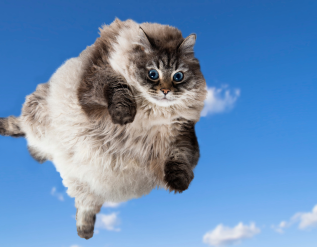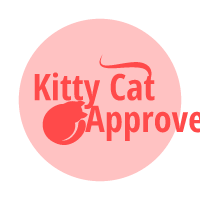“Conquering The Feline Fat: Battling Obesity In Our Beloved Cats”
- by kittycatapprove.com
- Posted on 29/02/2024

In recent years, there has been a growing concern over the health of our feline companions. The rise in obesity among cats is becoming an epidemic and it’s up to us as responsible pet owners to address this issue. Obesity not only affects humans but also our beloved furry friends, and it’s time we take action to help them conquer their weight problems. In this blog post, we will dive into the world of feline obesity, understanding its root causes and the consequences it can have on our cats’ health. We will also explore ways to create a healthy diet and feeding routine for your cat, as well as incorporating exercise into their lifestyle. Additionally, we will touch on behavioral factors that contribute to feline obesity and how you can seek professional help from your veterinarian. Lastly, we’ll provide some tips for maintaining a healthy weight in cats so that we can keep our feline friends fit and happy.
Introduction: The Growing Epidemic Of Feline Obesity
According to recent studies, more than half of all cats are overweight or obese. This alarming statistic is a cause for concern as obesity can lead to serious health issues such as diabetes, heart disease, and joint problems in cats. As pet owners, it is our responsibility to ensure the well-being of our beloved cats and that includes keeping them at a healthy weight. In this blog post, we will explore the causes and consequences of feline obesity and provide practical tips on how to battle this issue and help our furry friends live long and happy lives.
Understanding The Causes Of Obesity In Cats
While it may be easy to simply attribute weight gain in cats to overeating and lack of exercise, the reality is that there are many underlying factors that contribute to this issue. Some of the most common causes of obesity in cats include a sedentary lifestyle, age, breed, and certain health conditions such as hypothyroidism and diabetes. Additionally, feeding our cats too much or giving them high-calorie treats can also play a significant role in their weight gain. By understanding these causes and taking proactive steps to combat them, we can help our furry friends lead healthier and happier lives.
The Health Risks And Consequences Of Feline Obesity
According to recent studies, about 60% of cats in the United States are either overweight or obese. This excess weight can lead to various health risks and consequences for our furry friends. Some of the major risks include diabetes, joint problems, heart disease, and respiratory issues. These conditions can greatly impact the quality of life for our cats and even shorten their lifespan. It is crucial for us as pet owners to recognize the signs of obesity in our cats and take action to prevent it. By understanding the potential health risks and making necessary lifestyle changes, we can help our feline friends live a healthier and happier life.
Creating A Healthy Diet And Feeding Routine For Your Cat
One of the key factors in maintaining our cats’ health is their diet and feeding routine. Just like humans, cats need a balanced and nutritious diet to thrive. However, with pet obesity becoming a growing concern, it’s crucial to pay attention to what we’re feeding our feline friends. The right combination of high-quality food and a consistent feeding routine can make all the difference in preventing obesity and promoting overall well-being. In this blog post titled “Conquering the Feline Fat: Battling Obesity in Our Beloved Cats,” we’ll dive into some tips for creating a healthy diet and feeding routine for your cat to help them lead a long and happy life.
Incorporating Exercise Into Your Cat’s Lifestyle
As cat owners, we all want our feline friends to live long and healthy lives. This is why it’s important for us to incorporate exercise into our cat’s lifestyle. Not only does exercise help maintain a healthy weight, but it also has numerous benefits for our cats’ physical and mental well-being. By engaging in playful activities like interactive toys or daily play sessions, we can keep our kitties active and prevent them from becoming overweight. So let’s take steps towards conquering feline fat by making exercise a regular part of our cat’s routine!
Addressing Behavioral Factors Contributing To Feline Obesity
When it comes to feline obesity, many cat owners tend to brush it off as a minor issue or even something cute. However, the truth is that obesity in cats can have serious consequences on their health and overall well-being. As responsible pet owners, it is our duty to address the behavioral factors that contribute to this condition. One of the main culprits is overfeeding, which can stem from showing affection through food or simply leaving food out all day. It’s important to establish a feeding schedule and measure out appropriate portions for your cat’s size and activity level. Limiting treats and providing a balanced diet with high-quality protein is key to keeping your cat at a healthy weight. Additionally, regular exercise through play and providing environmental enrichment can help prevent weight gain and keep your cat mentally stimulated. By addressing these key behavioral factors, we can conquer feline fat and ensure our beloved cats live long, healthy lives.
Seeking Professional Help: Working With Your Veterinarian To Tackle Your Cat’s Weight Problem
If you’re concerned about your cat’s weight and have tried various methods to help them lose the excess pounds with little success, it may be time to seek professional help. Your veterinarian is a valuable resource in tackling your cat’s weight problem as they can provide expert advice and guidance specific to your cat’s needs. They can also rule out any underlying health issues that may contribute to the weight gain or make it difficult for your cat to lose weight. Working together with your vet, you can develop a customized plan that addresses your cat’s diet, exercise, and overall lifestyle to achieve a healthy weight and improve their overall well-being. Remember, regular check-ups and follow-up appointments will be important in monitoring progress and making necessary adjustments along the way. Don’t hesitate to reach out to your veterinarian for support in conquering feline obesity – they are there to help you every step of the way.
Conclusion: Keeping Our Feline Friends Fit And Happy
In conclusion, our beloved feline friends deserve to live a healthy and happy life. As responsible pet owners, it is our duty to ensure that they maintain a healthy weight and stay active. By following the tips mentioned in this blog post, we can conquer feline obesity and help our cats achieve their optimal physical and mental well-being. A few small changes in their diet, exercise routine, and environmental enrichment can make a significant difference in their overall health. Let’s commit to keeping our feline friends fit and happy so that they can continue to bring love, joy, and companionship into our lives for many years to come.
Resources:
How can I tell if my cat is overweight?
